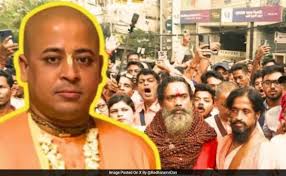
27-Nov-2024 , Updated on 11/27/2024 9:24:58 PM
ISKCON Leader Arrest in Bangladesh: Insia's Instance on Bail Deniel
Government authorities in Bangladesh have arrested an ISKCON leader, leading to fury amongst devotees and human rights activists.
Even with regards to the specifics of the charges against the leader being vague at this stage, the fact that the Indian government has been criticised for not doing more to support its interest in combating the violation of the rights of its citizens over the denial of bail raises eyebrows. Here is the breakdown and knowing why this is a problem, not just for ISKCON but for India’s foreign policy.
The Arrest: What Happened?
Media coverage shows that ISKCON leader, a senior man in a religious organisation in Bangladesh, was arrested for some alleged allegations against his religious activities. Bangladesh has always claimed to be a secular state, but instances of attacks on Hindu minorities and organisations tell a different story.
Arrests have caused ripple effects amongst the Hindu community, let alone Bangladesh, across the world. He has been denied bail time and again, and such a situation fuels the idea that there could be a political or communal vested interest in this case.
The ways that India protects the interests of Hindus in foreign cultures
1. Silence Isn’t an Option
India being the largest Hindu-populated country and a regional power must take it upon themselves diplomatically to protect Hindus abroad. The movement has been very significant in the process of India’s soft power diplomacy because it is an Indian socio-spiritual movement that has gone to the four corners of the world.
Many see the arrest and subsequent use of refusal to be granted bail as a direct disrespect of Hinduism and any of its followers.
2. The precedent it sets
They said if India does not intervene assertively, it will have set a bad precedent. If the revered leader of ISKCON, a global religious organisation, can be treated this way without anyone in the Bangladeshi government making a fuss, what does that mean for regular Hindus in BD?
Bangladesh’s Secular Claims: A Reality Check
In the constitution of Bangladesh, secularism is given priority, but in practical life, it cannot be seen. In recent years, Hindu minorities have been attacked, temples demolished, and Hindu individuals singled out for harassment, thus erasing the secular image of the country.
The ISKCON community—which runs several temples and charitable organisations in Bangladesh—has not been a stranger to such animosity. This forms part of a growing intolerance as it arrests one of its key leaders.
India’s Leverage
Bangladesh and India enjoy the relationship of historical, cultural, and economic cooperation. Among all those factors, influence has a large extent due to its stakes, which are bigger than Bangladesh and is its strategic partner in the region. However, this attitude of not taking timely actions that require a high level of confirmability raises many questions about the priorities of the Indian government. Is New Delhi capable of holding back from putting pressure on Dhaka, even if that means turning a blind eye to the Hindu follies?
The Reasons Why Denial of Bail is Problematic
1. Flawed Legal Justifications
Legal advisers have noted that the materials accusing the head of ISKCON are unfounded. Refusal to grant a defendant bail in such circumstances will lead to criticism of the judicial system.
2. A Political Message?
Several analysts consider the bail denial may have a political background—that the authorities decided to detain the accused to satisfy some radical forces in Bangladesh. If true, this makes India’s silence even more puzzling, not to mention absurd, coming from an aspiring nuclear power aspiring economic giant of the south.
3. A Question of Religious Freedom
The case highlights a larger issue: the decline of religious freedom in South Asia. This is not how a leader who has promoted peace and order should be treated; it also does not justify Bangladesh’s claims of secularism and tolerance.
What Should India Do?
Now, it is time for India to wake up to this matter and start taking action.
Here’s what it can do:
- Diplomatic Pressure: India must openly call for the Bangladeshi government to be more open about the legal system and urge the reconsideration of the bail refusal now.
- Leverage International Forums: The powerful political and diplomatic platform is available to India, and India can use it effectively to put pressure on and raise issues in the international human rights forums for justice.
- Public Support: The government should publicly come out and distance itself from the arrest and bail out the arrest by terming it as anti-Hindus globally.
- Monitor Minority Rights: This write-up should therefore encourage India to keep track of the treatment of Hindus in Bangladesh and other neighbouring countries.
Conclusion: Time for Action, Not Words
The arrest and the denial of bail to the ISKCON leader in Bangladesh is an editorial challenge to India’s diplomatic stamina and ideological compass. The government needs to see that it is not about one person or one company—it is about making a statement to the entire world that India will not stand for this sort of attack against its culture and people.
Such challenges cannot be met with silence, and this explains why women are coming out to speak. It is high time for India to awaken and galvanise our stand and support the protection of the global spiritual heritage and justice.

Student
hey there! i am a student currently pursuing my bachelors with a keen interest in writing., I am fueled by a deep love for storytelling and a flair for creating captivating narratives. Armed with a passion for language and a keen eye for detail, I strive to craft compelling copy that leaves a lasting impact.
Join Our Newsletter
Subscribe to our newsletter to receive emails about new views posts, releases and updates.
Copyright 2010 - 2026 MindStick Software Pvt. Ltd. All Rights Reserved Privacy Policy | Terms & Conditions | Cookie Policy